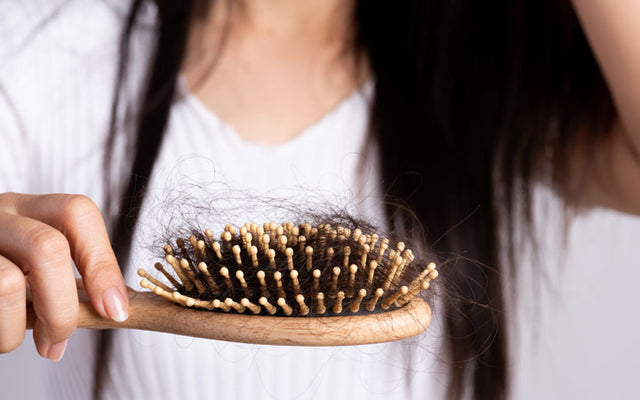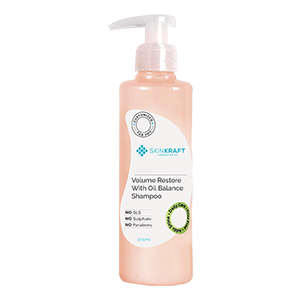Have you been noticing excessive hair fall after a stressful or traumatic phase you went through recently? You could be having telogen effluvium. No, it is not as scary as it sounds! However, we do understand that hair loss, especially after a shock, can take a toll on your mental health and add up to more stress.
This is why we are here for your rescue. Hair loss from telogen effluvium is absolutely reversible. We will tell you how. Keep reading.
What Expert Says
“Chronic telogen effluvium is difficult to manage. Hence, its treatment is safest under dermatologist care.”
Dr. Harish Koutam, Chief Dermatologist, SkinKraft
Highlights:
What Is Telogen Effluvium?
Telogen effluvium [1] is a temporary hair loss condition that is often a result of stress or trauma. Hair may fall out in large clumps, but it can grow back after a certain period. It is normal to lose 50-100 strands in a day. But anything above this is considered abnormal. Telogen effluvium, unlike alopecia, is a reversible hair loss condition.
Let us understand the three phases of the hair cycle first. [2]
1. Anagen Or Growth Phase
This is the phase where hair grows out from the roots and lasts upto 3-7 years.
2. Catagen Or Transitional Phase
The hair is in slow growth phase and the follicle shrinks. This is usually only for 2-4 months.
3. Telogen Or Resting Phase
The old hair falls out and gives way for new hair to emerge from the roots.
Generally, at any given time, 5-10% of hair is in the telogen or resting phase. But in telogen effluvium, 30% of hair moves into the telogen phase and refuses to shift to the other two phases.
There are two types of telogen effluvium:
1. Chronic Telogen Effluvium
In chronic telogen effluvium, a person may experience hair shedding that lasts upto 6 months or more.
2. Acute Telogen Effluvium
Acute telogen effluvium is a hair loss condition that can remain for less than 6 months.
Dr. Harish Koutam, Chief Dermatologist at SkinKraft says, “Telogen effluvium is acute and chronic. Treating the cause can reduce hair loss in acute conditions. Chronic telogen effluvium is however difficult to manage. Hence, its treatment is safest under dermatologist care.”
Who Is At Risk Of Getting Telogen Effluvium?
Telogen Effluvium can affect both men and women irrespective of age groups. However, it's more common in women. In women, it is more visible among the ones with thick and long hair. Women with normal hormonal functions too may experience prolonged phases of telogen effluvium that includes tremendous hair loss over years. Someone with consistent (over 6 months) telogen effluvium hair loss might be experiencing a chronic one that might even extend to over 6 years.
How To Identify Telogen Effluvium?
Telogen Effluvium can initially be characterized by thinning of hair on your scalp that's either limited to one particular area or is spread across all over. However, the The most obvious symptom of telogen effluvium [3] is an increased amount of hair fall. You may notice large amounts of your hair falling out more than usual while brushing or washing.
The top of the scalp is the most affected area. In rare cases, it may cause your hairline to recede. But, it's also unlikely that you will lose all of your hair.
Some of the common symptoms are:
- An increased amount of hair shedding
- Hair thinning
- The scalp may look less dense than usual
How To Diagnose Telogen Effluvium?
A physical examination of the scalp and a medical history can help diagnose telogen effluvium. There will be visible patches of thinning hair if the hair fall started a few months ago.
The gentle hair pull test gives at least two hair strands with each pull. A wash test can be performed to count the number of strands lost during a wash. A blood test can determine if the hair loss is due to iron deficiency [4] or thyroid.
Consult your doctor to diagnose telogen effluvium. Your doctor will look at the other points that indicate the health of your hair such as your scalp’s appearance, patches of baldness, if any, etc.
What Causes Telogen Effluvium?
A variety of factors can trigger a disturba
hair fallnce in the normal hair cycle.
-
Stress, shock or trauma - A prolonged relationship stress, death of a family or any other traumatic event in life can trigger hair follicles to remain in the resting phase or telogen phase.
-
Hormones - A sudden change in hormone levels can trigger telogen effluvium hair loss. Fluctuation in hormone levels can cause hair follicles to go into a prolonged state of rest.
-
Pregnancy and childbirth - During pregnancy, you pop a lot of vitamin supplements and your hair is in a growth phase. Due to hormonal changes after childbirth, hair enters the telogen phase. This kind of hair loss is called postpartum telogen effluvium.
-
Menopause - Menopause [5] is another triggering factor because of the hormonal changes during this period.
-
Poor diet - If you are deprived of vitamins (A, B, D, K and E), minerals (zinc, iron) and protein [6], your hair may enter the telogen phase. Imbalanced diet can also lead to telogen effluvium.
-
Certain drugs - The ingredients in some medications or drugs can hamper the hair cycle and push the hair follicles into the telogen phase.
-
Surgery - Surgery means some amount of mental stress, poor diet and medications. All these directly contribute to telogen effluvium.
-
Underlying medical conditions - Autoimmune disorders [7], where the body attacks its own hair follicles, conditions that affect the thyroid gland and alopecia areata may be causing telogen effluvium. Autoimmune disorder itself can’t be cured or reversed, but can be managed.
-
Metal toxicity - You can experience hair loss too if you come in contact with toxic chemicals in metal.
Treatment Of Telogen Effluvium
Once the triggers of telogen effluvium are rectified, hair can grow back with the following solutions:
1. Correcting Nutritional Deficiencies Through Diet
You might be missing out on a few essential nutrients and vitamins that are essential for healthy hair. Make sure to increase your intake of protein, vitamins and minerals like zinc and iron. Foods that are enriched with nutrients for hair include eggs, dairy, omega-3 fatty acids [8], nuts, spinach, sweet potatoes, avocados, berries and so on.
You can always check with your doctor if you are taking enough vitamin D, zinc, or iron.
2. Opt For Gentle Hair Care
Switch to gentle hair care that suits your hair. Say no to toxic ingredients like sulfates [9], parabens, alcohols, fragrances, dyes, etc. in shampoos and conditioners. Keep heat styling like straightening, blow drying and curling for special occasions. Visit salons less frequently for your dyeing, perming or bleaching sessions.
3. OTC Medication
OTC (over the counter) products can be used for hair regrowth. Minoxidil (5% strength ) [10] can be applied on the scalp during the night. It functions by prolonging the anagen or growth phase of hair.
4. Hormone Replacement Therapy
Menopause decreases the level of female hormones in the body. Hormone replacement therapy [11] aims to replace them. Talk to your doctor before you think of hormone replacement therapy as it can leave side effects like breast swelling, bloating, nausea, headaches and mood swings.
5. Management Of Stress
Your hair loss might be related to stress too. Turn to healthy ways to manage stress. Yoga asanas, pranayama or breathing exercises and meditation are all safest bets.
Diet For Telogen Effluvium
|
Nutrient |
Foods |
|
Vitamin A |
Carrots, spinach, milk, eggs, yogurt, cod liver oil, red pepper, broccoli, peas, apricot, pumpkin. |
|
Vitamin E |
Nuts, peanuts, hazelnuts, vegetable oil, wheat germ, spinach, kale, and almonds. |
|
Vitamin B7 |
Almonds, sweet potatoes, cauliflower, spinach, broccoli, mushrooms, peanuts, walnuts, milk, salmon, cereals, avocados, raspberries. |
|
Vitamin C |
Citrus fruits like lemon, oranges, tomatoes, broccoli, cauliflower, peppers, spinach, cabbage, brussels sprouts, guava, parsley. |
|
Vitamin D |
Mushrooms, grains, fortified juices, fish, low-fat fortified milk. |
|
Protein |
Eggs, meat, fish, tofu, yogurt, cottage cheese, legumes, nuts, whole grains. |
|
Iron |
Meat, spinach, oyster, chicken, green leafy vegetables, fish and legumes. |
|
Zinc |
Nuts, pumpkin seeds, beef, eggs, dairy, meat, shellfish, legumes, potatoes, green beans, dark chocolate and whole grains. |
Tips For Telogen Effluvium Regrowth
- Consider a haircut
- Focus on diet and nutrition
- Avoid heat styling
- Avoid coloring or bleaching your hair
- Avid hair loss-inducing stressor
- Manage your stress levels
How Long Does It Take To Recover From Telogen Effluvium?
Telogen effluvium is a self correcting condition, meaning it can resolve itself in 3-6 months. If triggers like stress, diet or hormonal imbalances are normalized, telogen effluvium can be cured. After a period of six months, the hair enters the anogen or growth phase. You can grow hair and expect a full recovery in about 6-12 months.
Telogen Effluvium Vs Male Pattern Baldness
Telogen effluvium is different from androgenetic alopecia or male pattern baldness [12]. In male pattern baldness, one experiences extreme hair loss that is generally irreversible. In telogen effluvium, about 30% of hair only goes to the telogen or resting phase, which is temporary. It resolves on its own in the span of six months.
Can You Go Bald From Telogen Effluvium?
One does not go completely bald in telogen effluvium. There are only thinning patches in one or more spots on the scalp. Only 30% of hair enters the telogen or resting phase, causing hair fall. The other 70% is still in the growth phase and transitional phase.
Wrapping Up
Telogen effluvium is the second biggest cause of hair loss in people, according to dermatologists. There is no medical treatment as such since it is a temporary hair loss condition. Lifestyle changes and dietary changes can stop the unusual shedding of hair. However, do consult your doctor for proper diagnosis.
1. https://www.ncbi.nlm.nih.gov/books/NBK430848/
2. https://www.ncbi.nlm.nih.gov/pmc/articles/PMC4755418/
3. https://www.ncbi.nlm.nih.gov/pmc/articles/PMC4606321/
4. https://www.ncbi.nlm.nih.gov/pubmed/16635664
5. https://www.nia.nih.gov/health/what-menopause
6. https://www.ncbi.nlm.nih.gov/pmc/articles/PMC5315033/
7. https://medlineplus.gov/ency/article/000816.htm
8. https://www.ncbi.nlm.nih.gov/pubmed/25573272
9. https://www.ncbi.nlm.nih.gov/pmc/articles/PMC4651417/
10. https://www.ncbi.nlm.nih.gov/pmc/articles/PMC6691938/
Recommended Products
Was this Article helpful?
- Least helpful
- Most helpful











